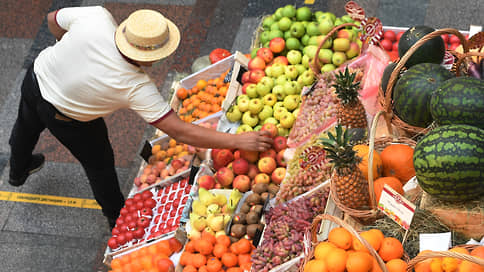The fruits of zeroing – Newspaper Kommersant No. 182 (7383) dated 03.10.2022
[ad_1]

Due to the crisis in the economy, retail chains are trying to reduce the cost of importing a number of products. The Association of Retail Trade Companies (AKORT) asks the Ministry of Agriculture to support the zeroing of duties on the import of certain vegetables, fruits, seafood, nuts, coffee and other items. Experts believe that the measure can curb inflation. But Russian producers fear that preferential imports will hurt their business.
The Ministry of Agriculture is considering the proposals of AKORT (includes X5 Group, Magnit, Lenta, Auchan, etc.) to zero import duties on certain categories of products. This is stated in a letter from the ministry to a number of industry associations dated September 28, which Kommersant has read. Chairman of the AKORT Presidium Igor Karavaev, a copy of which is also available to Kommersant, in September asked the head of the Ministry of Agriculture Dmitry Patrushev to support the establishment at the EEC level of zero duty rates on the import of a number of vegetables, fruits, shrimp, salmon, trout, mussels, olive oil, olives , nuts, Arabica and Robusta coffee. Now the import of these goods is subject to duty from 3% to 15%. AKORT proposes to introduce duty-free import from October 1, 2022 to March 31, 2023.
As Mr. Karavaev writes, “in a period of unstable economic situation and rising prices,” the initiative will help contain the cost of food for consumers. Some of these products are not produced in the Russian Federation or are required for seasonal replacement, the proposals say. Rosstat estimated food inflation in Russia in August at 15.77% in annual terms. AKORT and networks did not provide comments. The Ministry of Agriculture told Kommersant that the initiative would be considered by the subcommittee on customs and tariff regulation.
“Kommersant” also got acquainted with the feedback on the initiative of a number of industry associations. The Association of Nurseries and Gardeners of the Stavropol Territory opposes the zeroing of duties on the import of apples, pears, plums, cherries and peaches. As the chairman of the association, Aidyn Shirinov, writes, from September to December there is a mass sale of Russian apples, and from January to May, fruits from storage facilities are sold. During the period of mass harvesting of apples in Russia, imports already occupy 65-75% of the market, which leads to a decrease in purchase prices for local fruits and “undermines the economy” of local suppliers, Mr. Shirinov told the Ministry of Agriculture.
The response of the National Fruit and Vegetable Union to the Ministry of Agriculture also states that the supply of cheap imported tomatoes will reduce the competitiveness of local products. According to a Kommersant source, the main suppliers of tomatoes in the Russian Federation – Azerbaijan, Turkey and Turkmenistan – grow tomatoes in greenhouses at minimal cost, which makes them cheaper than Russian ones. According to the union, in 2021, local tomatoes occupied about 60% of the Russian market, but import substitution may slow down. Ramaz Chanturia, director general of the Roschaikofe association, suggests that AKORT is trying to zero out duties on goods that the chains import themselves. According to him, up to 80% of the coffee market is occupied by locally roasted products, and the zeroing of import duties may have a negative impact on Russian processors.
Representatives of some sectors of the agro-industrial complex support AKORT proposals. German Zverev, President of the All-Russian Fisheries Association, believes that zeroing import duties on a number of biological resources would be useful, given the insufficient production of trout, shrimp and rising logistics costs. Irina Koziy, General Director of the Berry Union, notes that in the case of fruits, duties of 3% have little effect on sales, but in the face of declining income, any price reduction is noticeable.
Marat Ibragimov, a senior analyst at Gazprombank, agrees that the reduction of foreign trade barriers will help reduce prices and become a deterrent to food inflation. According to him, for networks, low prices allow them to maintain high traffic and sales density. X5 Group said in a report for the first half of 2022 that the company invested in prices to compensate for high inflation, and along with a decrease in bonuses from suppliers, this led to a slight decrease in profitability.
[ad_2]
Source link





